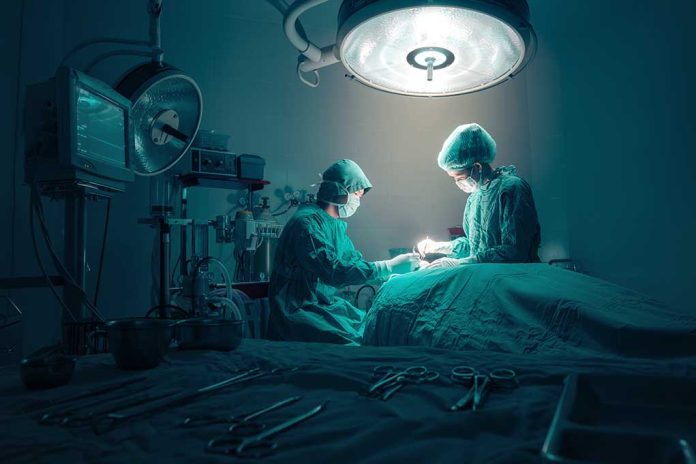
Anthony Thomas “TJ” Hoover II astonished medical staff by waking up during an organ harvesting operation in Kentucky, challenging protocols determining brain death.
At a Glance
- TJ Hoover was declared brain dead but awoke during organ harvesting.
- The incident questions the rigor of brain death protocols.
- KODA and Baptist Health assert adherence to strict protocols.
- Family hopes the story prompts reevaluation of organ donation procedures.
Incident Overview
In October 2021, Anthony Thomas “TJ” Hoover II was hospitalized in Kentucky following a drug overdose. Despite efforts, he was declared brain dead after suffering cardiac arrest. Subsequently, his family made the heart-wrenching decision to proceed with organ donation. However, during what was supposed to be a routine organ retrieval surgery, Hoover startled everyone by regaining consciousness, halting the procedure immediately.
Hoover was admitted to Baptist Health Richmond’s emergency room on October 25, and tests were performed to confirm his brain death status, which his family believed was accurate. As the procedure began, his sister, Donna Rhorer, noticed signs of life but was reassured they were merely reflexive actions, delaying any alarm.
Kentucky man declared brain dead wakes up during organ harvesting https://t.co/mAxxewDtSM
— The Guardian (@guardian) October 19, 2024
Critical Concerns and Investigations
Multiple eyewitness accounts and further evaluations uncovered that Hoover displayed motor responses inconsistent with brain death, leading to further scrutiny of the hospital’s protocols. Natasha Miller, a witness, described him as visibly alive and conscious during the preparations for surgery, causing two doctors to opt out of the procedure. This has sparked concern about the possibility of hasty determinations of death and the lack of sufficient oversight in Organ Procurement Organizations. The Kentucky Attorney General’s Office is currently investigating the matter. “It’s not infrequent that something comes up around the donor and whether or not the donor is dead. And the problem is we’ve had 40 years where there has been no oversight at all of OPOs.” stated Dr. Seth Karp
While the family navigates these distressing revelations, Baptist Health and KODA maintain their position on following stringent protocols, expressing concern over potential miscommunication and misrepresentation of the events involved. They continue to emphasize their commitment to ethical practices and patient safety.
Family’s Response and Broader Implications
Hoover’s sister, Donna Rhorer, now caring for him, voiced feelings of betrayal and advocates for improved communication and protocol adherence to prevent future incidents. She desires to share their story to encourage other families to question and verify medical decisions regarding organ donations. Meanwhile, Hoover is focused on recovery, facing continued cognitive and physical challenges.
This case has raised broader questions about the rigor of the organ donation process, particularly in light of the substantial waiting list of over 100,000 individuals across the country. As public awareness grows, concerns are increasing about the potential erosion of trust in the organ donation system, highlighting the critical need for openness, accuracy, and policy reforms.













